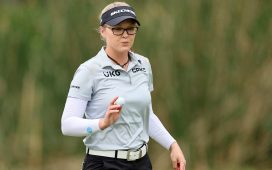Check in every Sunday night for the unfiltered opinions of our writers and editors as they break down the hottest topics in the sport, and join the conversation by tweeting us @golf_com. This week we discuss the “short hitters” competing on the PGA Tour, the next big stars in golf, new Tour venues ready to debut, the aftermath of the 2018 Ryder Cup and more.
1. Chez Reavie picked up his second PGA Tour title Sunday, cruising to a four-shot win at the Travelers. Reavie averages “only” 286 yards off the tee, which puts him outside the top 150 on Tour in that category. Do short hitters have enough chances to win on Tour?
Luke Kerr-Dineen, instruction editor (@LukeKerrDineen): Power has always been an important part of golf. People used to talk about Bobby Jones’ booming drives, and Slammin’ Sammy Snead. The modern era is no different in that regard, but unlike those days, the difference nowadays is that power all too often goes unchecked. Short, straight drivers are punished disproportionately more than longer, more wayward drivers. That serves to strip the game of its diversity by creating a prototype of how players must play, swing, and be. The more golf can figure out ways to level the playing field for equally good — but different — types of players, the game will be better off for it.
Josh Sens, contributing writer: As Luke says, bombers have always had an advantage. But look at the Tour’s list of winners this year (Kisner, Kuchar more than once, Justin Rose, Francesco Molinari). There’s been plenty of opportunity for the non-bombers to win. Sure. The game can take some steps to level the playing field by choosing certain venues and setting them up in certain ways. But the Tour remains enough of a meritocracy for me — the golfer who golfs his ball the best still has plenty of chance to win, no matter how far he hits it. No need to start legislating beyond that out of some exaggerated sense of “fairness.” Should the NBA start lowering the hoop to make it easier for everyone to dunk?
Jeff Ritter, digital development editor (@Jeff_Ritter): I’m with Sens here. Big drives can take you places on the PGA Tour, but so can great putting, iron play, scrambling, and an unshakable mental game. Occasionally there are course setups that skew to the mashers, but overall I think shorter hitters have a shot. They just have to find other ways to get it done.
Michael Bamberger, senior writer: The shorter the course, the more chance there is for more players. Twenty-plus years ago, Nick Price said the best way to Tiger-proof the courses was to make them shorter. He had it correct and nothing has changed. The game is better in every possible way (for the pros) at 7,152, but fellas and chicks dig the long ball, so we all know how that goes. There will be fewer chances for shorter hitters in the future, but there will always be an Open championship. God Save the Queen. Where have you gone, Larry Mize? By the way, his swing was beautiful, back in the last days of the Rhythm Method.

2. Two of the game’s most promising up-and-comers turned pro prior to the Travelers Championship: reigning U.S. Amateur winner Viktor Hovland (T54), and reigning NCAA individual champion Matt Wolff (MDF). Which of these players is best equipped to make the leap from rising star to superstar?
Kerr-Dineen: They’re both going to be awesome, but my money’s on Hovland. He’s in slightly better form at the moment, and thinking longer term, his swing does so many of the things that modern golf coaches teach. It’s why I’m already on record calling him Dustin Johnson 2.0. I meant it at the time, and I mean it again now.
Sens: So hard to predict, but also very hard to go against Hovland given what he’s shown so far. Love the fact that they both so beautifully own their idiosyncratic-looking swings. Not the same all youthful Robo-pros.
Ritter: I’m still getting acquainted with both, but Hovland has had more screen time lately and certainly has a star-in-waiting quality to his game. I’d also toss Collin Morikawa into this mix — another new pro who looks ready to win sooner rather than later.
Bamberger: I have no idea but in the spirit of the foregoing I’ll say Matt because I like different — different with a reason — and his swing is.
3. The PGA Tour now moves to back-to-back new events in Detroit (Rocket Mortgage Classic) and Minnesota (3M Open). How important are the inaugural years for first-time Tour venues?
Kerr-Dineen: I don’t have any data to support this, but I suspect not very. It’s really all about the field. Give it a few years to settle into the schedule. If the field doesn’t start getting stronger, that’s the first meaningful red flag.
Sens: I’m with Luke here. These guys will play on an airport tarmac if the schedules align and the money is right. Less about the venue may be part of the allure, but it’s not the deciding factor.
Ritter: I’m not overly worried about the first year, but hopefully the course setups are fair and interesting. You don’t want the venue to turn off the players. Both events are in golf-starved areas, so no one should sweat the fan turnout.
Bamberger: The second Masters was the one that made the difference, although the first U.S. Open was pretty special. I’ll say first impressions are always important, if not critical.








